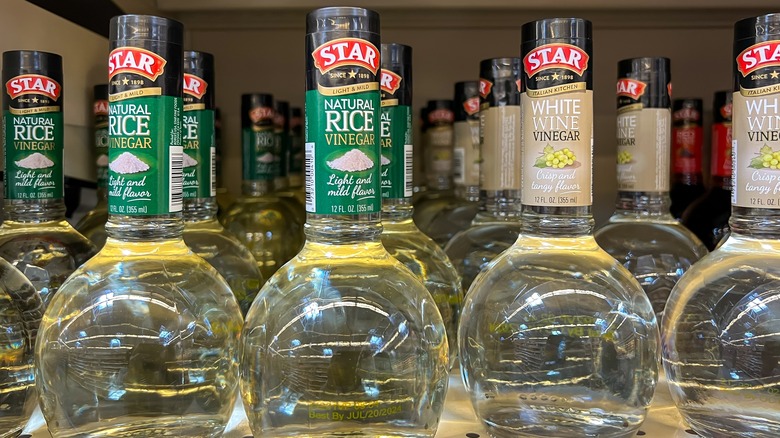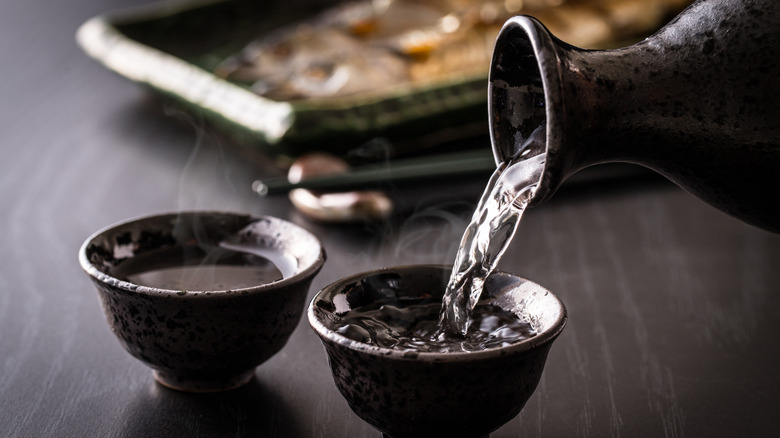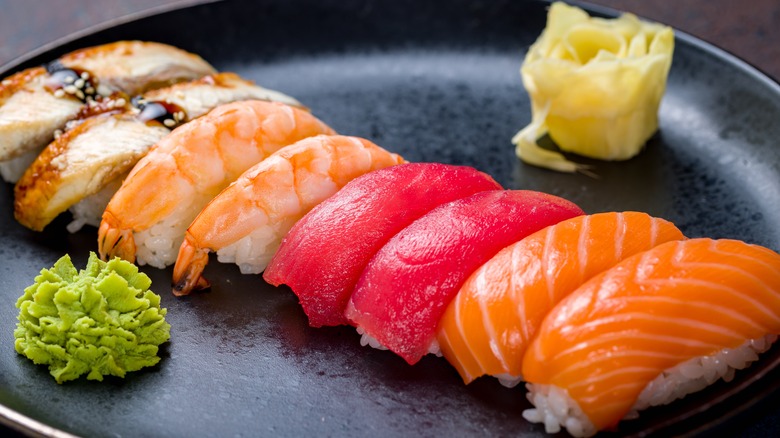What's The Difference Between Rice Wine And Rice Vinegar?
According to chef Samin Nosrat, anyone can learn to cook if they master the four pillars of cooking. They are Salt, Fat, Acid, Heat — incidentally, the title of her cookbook and wildly popular TV docu-series. The gist of this is that a balanced dish has these four elements, which gives people some leeway to experiment and substitute as needed.
Within the acidity category, some substitutions could work (like lemons for limes). But other elements that sound similar are actually very different. Take two common sources of acidity in Asian cooking: rice wine and rice vinegar (sometimes labeled as rice wine vinegar). These products sound similar, are often next to each other in the grocery aisle, and are made from the same product (fermented rice). But the process to make it is different — which means the taste profile is also different.
To be more specific, rice wine is an alcoholic drink that can also be used for cooking. Rice vinegar on the other hand (like its name suggests) is a vinegar. Below is a guide to help you to better understand the differences between rice wine and rice vinegar.
Rice wine is an alcoholic drink -- rice vinegar is, well, vinegar
Rice wine is a broad category of drinking or cooking rice wine that differs by country. Japan has sake and mirin, China has Shaoxing wine, and Cambodia has Sombai — which includes fruits, spices, and sugar cane. Rice wine can be made with regular or glutinous rice. The fermentation process uses yeast, fungi, and lactic acid bacteria to change the sugar in the rice into alcohol. This is why rice wine has an alcohol content of 18% to 25% ABV.
The quality of rice wine can also vary significantly by brand. For example, Japanese rice wine is made from polished glutinous rice. The more the rice is polished, the more likely the rice wine will be of higher quality — with an equally high price tag.
The process to make rice vinegar is similar, as it also uses yeast to ferment the sugar in the rice to alcohol. But the fermentation process continues until the mixture turns from alcohol into acetic acid, which explains the tangy taste.
Put simply, the difference between rice wine and vinegar is the same as the difference between white wine and apple cider vinegar.
Rice wine is sweeter, rice vinegar is more tart
Rice wine has a sweet, mild flavor. When a recipe calls for rice wine, it will usually specify a heating element to evaporate the alcohol. The best substitute for rice wine is white at a 1-to-1 ratio. But if you'd like to be more specific, pale dry sherry can replace mirin while dry sherry and sugar can replace Shaoxing wine.
Rice vinegar can be of the white, red, or black variety. Broadly, it has a delicate and sweet flavor and is less acidic than white wine vinegar. This is what is used to flavor sushi and give it a subtle tangy taste. It is a key acidity element for Asian-inspired marinades, sauces, and salad dressing and can also be used to pickle vegetables.
The best substitute for rice vinegar is apple cider vinegar. White or red wine vinegar can be a close replacement depending on the dish. White wine vinegar can be used as a rice wine substitute in vinaigrettes while red wine vinegar can be used as a rice wine substitute in rich meat dishes. If all you have on hand are lemons or lime, double the amount of juice for rice vinegar.
Now you are equipped to cook mirin glazed salmon or sweet and spicy sticky tofu and adjust the ingredients as needed. Just remember the mantra: Salt, Fat, Acid, Heat.


